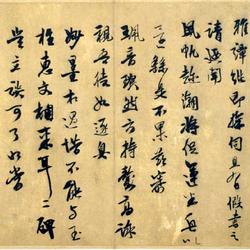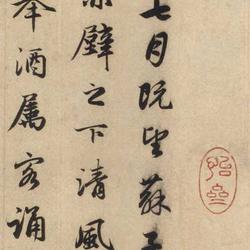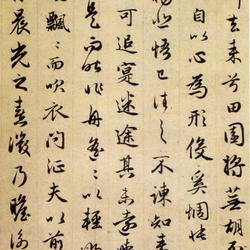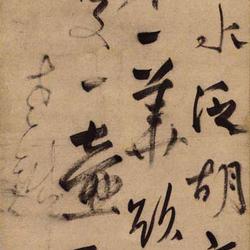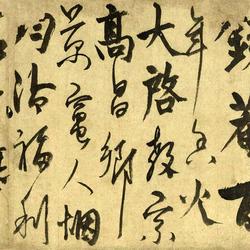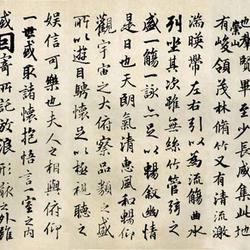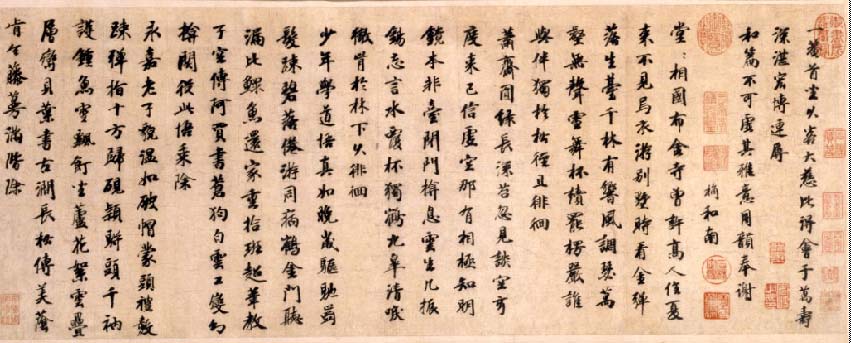
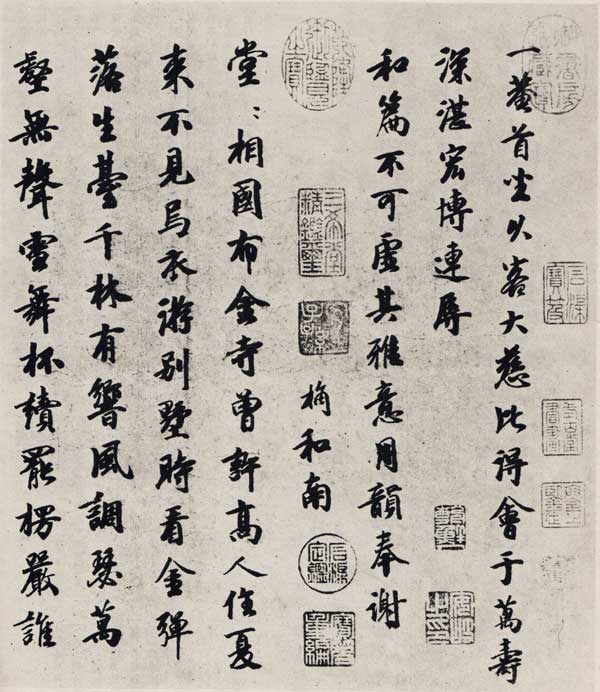
Yuan Jue's "He Yi'an Poems" paper version, running script, 31 vertical. Five, eighty-nine horizontally. seven centimeters
Explanation:
Sitting at the head of a nunnery: A long-term guest is so kind that he can be compared to Wanshou. He is profound and profound, and even insults and harmonious chapters should not be used in vain. Use rhymes to express thanks. Jue and Nan. The dignified Xiangguo Bujin Temple once allowed the master to live in Xia Lai. I don't see Wuyi visiting the villa, but sometimes I see the Golden Bullet Falling Stage. There is a sound of wind and rustling in thousands of forests, and the soundless snow dances in thousands of valleys. After reading Shurangama, who will accompany me? I will wander alone on the pine path.
Xiao Zhai is round and green with long deep moss, and suddenly I see the mysterious degree of empty space. I have believed that there is a form in the void, and I know that the mirror is not a platform. Close the door and cover your breath with a few clouds, Zhen Xi forgets to say and the water covers the cup. The crane alone, Jiugao, chirps clearly and is willing to linger under the forest for a long time.
When you are young, you learn the Tao and realize the true truth. When you are old, you drive and your teeth become cracked. Bi Luo is tired of swimming and has the same disease as a crane, and Jinmen Ting Le is better than a sole fish. He returned home and picked up Ban Chao's pen again, and taught Zikong to pass on the book of Amai. Cang Gou Bai Yun Gong changes his mind, hiding the pass and then understanding multiplication and division.
The old man from Yongjia has gentle ears and a gentle appearance. He wears a broken hat and covers his head with courtesy. Sitting on the reed catkins in the fluttering snow, the clouds are stacked on the mountains and the bay leaves are written. The long pines in the ancient stream spread their beautiful shade, and they were willing to clear the steps of the vines.
His teacher was from Yongjia, so he was the elder of Mozhang and Hengchuan.
The above information comes from the website of the Palace Museum
appendix:
Yuan Jue's "Sitting at the Head of a Nunnery" (Author: Lian Qi)
Yuan Jue (1266-1327), courtesy name Bo Chang and Qingrong Jushi, was born in Qingyuan (now Chuzhou, Zhejiang). In the early days of Dade, he was recommended by Yan Fu and Cheng Jufu to serve as a reviewer of the Hanlin Academy of National History. Later he was promoted to a bachelor of Jixian in the Hanlin Academy, knew about imperial edicts, and also studied national history. He moved to the Hanlin Academy to serve as a lecturer. In the early years of Taiding, he resigned and returned to his hometown. He died in the fourth year of Taiding. He was given the title of Zhongshu to participate in political affairs, and was posthumously granted the title of Duke of Chenliu County, with the posthumous title of "Wenqing". At that time, the imperial court produced many books and inscriptions on honorary ministers, and he was also the author of many articles at that time. He is the author of fifty volumes of "The Collection of Qingrong Jushi", "Yi Shuo", "Chun Qiu Shuo", etc. Mos Tianjue wrote an epitaph for him, and there is a biography in Volume 172 of "History of the Yuan Dynasty". "Shu Shi Hui Yao" said that "Gongshu came from the Jin and Tang Dynasties and became his own family." Volume 43 of "Qingrong Jushiji" contains his article "Sacrifice to Zhao Ziang and Chengzhi", calling himself "Cousin". Judging from his Fu Shi's calligraphy, his writings mainly benefited from Mi Fu. Yuan Jue once consulted Zhao Mengpin about Mi Fu and Xue Shaopeng's books. Zhao told him that "Xue's books are sincere and beautiful, and there is a slight suspicion that they are following the mold." However, Mi Fu's "politics are like Huang Taishi's poems, with the corners of his eyes brushed and begged." If there is beauty in Guiyun and Sichuan, then you will despise it." This kind of aesthetic thought prompted him to seek methods from "Jin and Tang Dynasties".
"Poem Sitting at the Head of Heyi'an Nunnery" paper version, running script, thirty-one lengths. Five, eighty-nine horizontally. Seven centimeters, the post is as follows:
Sitting at the head of a nunnery: A long-term guest is so kind that he can be compared to Wanshou. He is profound and profound, and even insults and harmonious chapters should not be used in vain. Use rhymes to express thanks. Jue and Nan. The dignified Xiangguo Bujin Temple once allowed the master to live in Xia Lai. I don't see Wuyi visiting the villa, but sometimes I see the Golden Bullet Falling Stage. There is a sound of wind and rustling in thousands of forests, and the soundless snow dances in thousands of valleys. After reading Shurangama, who will accompany me? I will wander alone on the pine path.
Xiao Zhai is round and green with long deep moss, and suddenly I see the mysterious degree of empty space. I have believed that there is a form in the void, and I know that the mirror is not a platform. Close the door and cover your breath with a few clouds, Zhen Xi forgets to say and the water covers the cup. The crane alone, Jiugao, chirps clearly and is willing to linger under the forest for a long time.
When you are young, you learn the Tao and realize the true truth. When you are old, you drive and your teeth become cracked. Bi Luo is tired of swimming and has the same disease as a crane, and Jinmen Ting Le is better than a sole fish. He returned home and picked up Ban Chao's pen again, and taught Zikong to pass on the book of Amai. Cang Gou Bai Yun Gong changes his mind, hiding the pass and then understanding multiplication and division.
The old man from Yongjia has a gentle face and a broken hat, covering his head with courtesy. He snaps his fingers in ten directions and returns to the inkstone. Sitting on the reed catkins in the fluttering snow, the clouds are stacked on the mountains and the bay leaves are written. The long pine trees in the ancient stream spread their beautiful shade, and they were willing to clear the steps of the vines.
His teacher was from Yongjia, so he was the elder of Mozhang and Hengchuan.
Seal 2. "Yuan Bochang" has a white seal, and "Qingrongzhai" has a red seal.
Yuan Jue's writing style for this post mainly benefited from Sui and Tang Dynasty people who wrote scriptures. It is very legal, and the knotting style has the style of people from the Jin and Song Dynasties, and it is more unrestrained and unrestrained. Influenced by Mi Fu, his brushstrokes were as smooth as a brush, but he was not sharp-edged. Learning from the calligraphers of the Jin and Tang Dynasties makes the calligraphy have a more ancient meaning than that of ordinary calligraphers of the Song and Yuan Dynasties, but it is entirely his own style without being imitated. It does come from the Jin and Tang Dynasties.
Yuan Jue's extant ink writings include: "Tie of the Elder Jin Zhao", "Tie of Yatan", "Postscript of Huang Tingjian's Songfeng Pavilion Poems", "Postscript of Wang Tingjun's Bamboo Withered Cha Tu", "Postscript of Wulan Pavilion" (Ke Jiusi's "authentic edition"). ")wait. Most of them are running script, and they are all written with precision and skill, and have a simple and innocent attitude. "Yuanlao Jinzhao Tie" and "Ya Tan Tie" are calligraphy rituals, so the writing style is elegant and graceful, and it seems to be unrestrained. The movement of Qi is very natural and appropriate. However, if you look closely, you can find that the writing style is very smooth. It is done deliberately and meticulously, and the entry and closing of each word, as well as the lifting and turning, are extremely controlled. Where the threads are drawn, the fine tendons penetrate into the bones, and the changes in weight and thickness are clear. When the strokes start and end, they are all drawn in, not drooped or shrunk. It is indeed the calm and joyful feeling of Mi Shu's pen pressing the paper and the pen leaving the paper. Some characters are quite dangerous, but due to the ingenious arrangement of the center of gravity of the characters and the appropriate concessions between the strokes, the artistic effect of seeking relief from danger is achieved without the disadvantage of being careless and revealing. He is a scholar and has originality. "Postscript to Wulan Pavilion" is written in a small form. It has a tight structure, strong turns, heavy strokes, and ancient writing style. It has the same meaning as "Poetry Sitting at the Head of an Annu". It is also clearly based on the writing style of Sui and Tang Dynasties, and has considerable influence. The artistic level is comparable to that of Zhao, Xian, and Deng in the calligraphy world of the Yuan Dynasty. Their style does not compromise, and they are outstanding in their own way. Yuan Qingrong is not famous for his books. His achievement is inseparable from his cultivation in all aspects. There are many inscriptions and postscripts about calligraphy and painting in "Qingrong Collection". It can be seen from this that he not only saw a lot, but also evaluated them after careful study. For example, the "Dingwu Lanting" that was seen at that time was compared and identified. The artistic value of the calligraphy of the famous "Ling Fei Jing" ink was only valued by people after his appraisal. The calligraphy and painting collection of Princess Xiangge Laji, the eldest sister of the Yuan Dynasty emperor, also relies on Yuan Jue's records so that future generations can have an understanding of it. Therefore, Yuan Jue is a figure who has contributed to the study of Chinese calligraphy and painting.
The inscription on this post is an nunnery, which is the name of worshiping Shouning. Wuwei, courtesy name of Shouning, was born in Yongjia and was the abbot of Jing'an Temple in Shanghai. "Selected Poems of the Yuan Dynasty" Guiji records: "The husband's house was planted with juniper, bamboo, tung and cypress on both sides, and he named it Yuanyun Cave. Together with the monuments in his temple, he called it 'Wu Stele', 'Chen Hui', and 'Zen' They are called "Jing'an", "Shanghai Barrier", "Yongquan", and "Ludu", which are the eight sceneries of Jing'an. Looking for those whose poems are more time-honored than poems, a volume of "Eight Odes of Jing'an" was created. Yang Weizhen of Kuaiji In order."
This post has been published in books such as "An Examination of Shigutang Calligraphy and Painting", "Mo Yuan Huiguan", and "The Continuation of Shiqu Baoji". It is one of the "Poetry Volumes of the Three Families of the Yuan Dynasty ".

